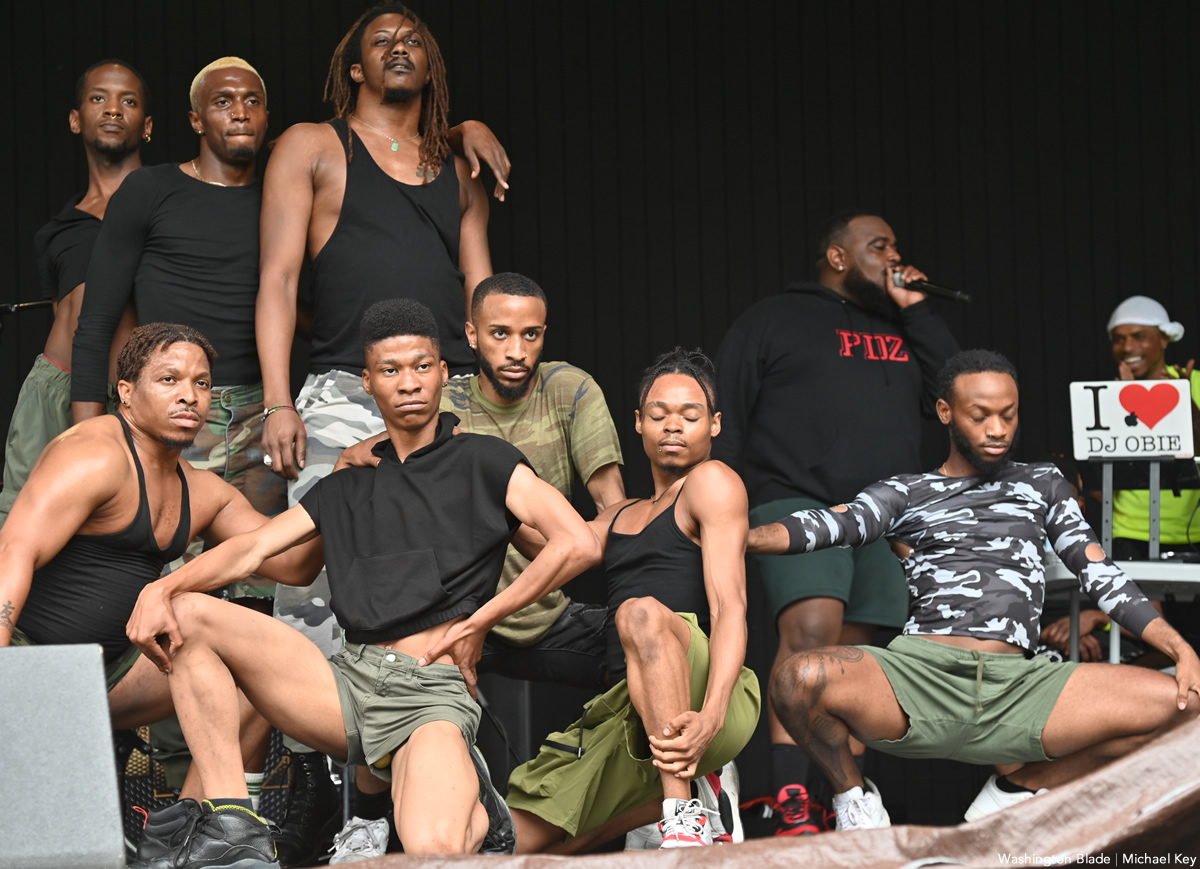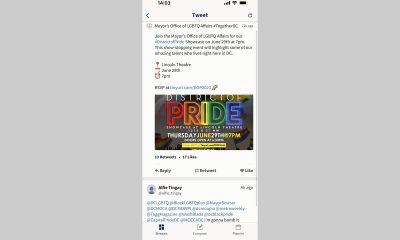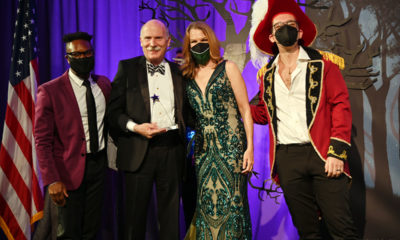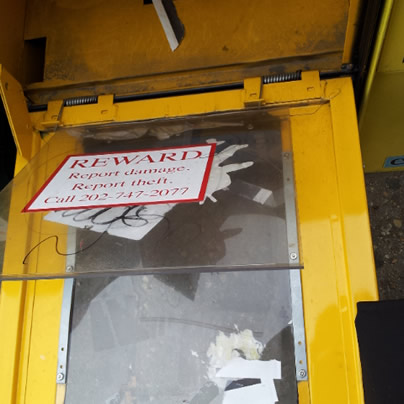Local
Metro Weekly sued for more than $1 million
Post-Newsweek lawsuit alleges fraud, seeks damages

Metro Weekly, a local LGBT magazine, is being sued over an alleged $85,000 printing debt by a company owned by Post-Newsweek Media, Inc., the media conglomerate that owns the Washington Post, according to a lawsuit filed July 8 in D.C. Superior Court. The lawsuit also seeks $1 million in punitive damages.
The lawsuit, which was first reported by the Washington Business Journal in its Aug. 6, 2010 edition (Vol.29 No.15), alleges that the company that owns Metro Weekly, Jansi LLC, and one of Jansi’s two shareholders, Randy Shulman, are responsible for a five-year-old printing debt with the Gaithersburg, Md., printing firm Comprint, a Post-Newsweek affiliate.
In addition to charging Jansi and Shulman with breach of contract for not paying the printing debt, the lawsuit accuses them of fraud for allegedly entering into a licensing agreement with Isosceles Publishing, Inc., the corporation that owned and operated Metro Weekly up until November 2007, for the alleged purpose of evading debts and liabilities.
“Upon information and belief, Mr. Shulman, Jansi, and Isosceles entered into the 2007 License Agreement with the specific intention to evade Isosceles’ creditors while continuing to publish, and reap revenue from, Metro Weekly,” the lawsuit says. “As a direct result of the defendant’s fraud, plaintiff suffered damages in a sum to be proved at trial but expected to exceed $1,000,000,” the lawsuit states in its request for punitive damages.
“We believe the lawsuit filed against Jansi LLC by Post-Newsweek is wholly without merit,” said William McLain, Jansi’s attorney.
McLain said he could not comment on any further details of the case until he files a response to the lawsuit later this month on behalf of Jansi.
“This story is totally premature for publication, and our responsive pleadings will support our claim that the lawsuit is without merit,” he told the Blade.
Although McLain has yet to file Jansi’s response to the lawsuit, Washington Business Journal quoted him as saying Post-Newsweek was not going to recover its money from Jansi because “it’s just not that corporation’s debt.”
Paul Thayer, the attorney representing Post-Newsweek, said he expects Jansi to argue in its response to the lawsuit that the printing debt was incurred by Isosceles Publishing, Inc., rather than Jansi.
Isosceles and Jansi entered into the licensing agreement in November 2007 in which Isoceles “granted to Jansi the exclusive right to publish Metro Weekly in exchange for a licensing fee,” the lawsuit says.
It says that Shulman disclosed in a deposition taken during a 2009 lawsuit filed by Post-Newsweek against Isosceles, in an earlier effort to collect the printing debt, that “each and every Isosceles employee was transferred to, and was exclusively compensated by, Jansi” after the licensing agreement took effect.
A Superior Court judge issued a judgment in Post-Newsweek’s favor on Dec. 11, 2009, ordering Isosceles Publishing to pay the $85,000 printing bill plus “pre-judgment interest at the rate of 6 percent per annum, dating from Feb. 1, 2009 to the date of judgment” along with court costs.
Thayer said Isoceles had yet to make any payments on the debt since the December judgment.
The July lawsuit argues that Jansi LLC and Shulman should be held responsible for the debt because “there has been a near complete intermingling of corporate funds, staff, and property between Isosceles and Jansi LLC.”
“Mr. Shulman has confirmed that one motive for the License Agreement was a desire to continue publishing Metro Weekly without having the publisher responsible for debts incurred by Isosceles,” the latest lawsuit says.
The lawsuit states that Sean Bugg, Shulman’s business partner, is the second of the two shareholders in Jansi LLC. Bugg is not named as a defendant in the lawsuit.
Meanwhile, in a related development, Washington Business Journal reported in the same story that “nearly $656,000 in federal and state tax liens have been filed against Isosceles,” according to data the newspaper said it gathered.
Public records available from the D.C. Recorder of Deeds, which keeps track of tax liens, show that 21 federal, D.C., or unemployment liens have been filed against Isosceles Publishing between 1996 and 2010. Thirteen are listed as a “U.S. Tax Lien.”
It could not be determined from the Recorder of Deeds docket listing of the Isosceles liens whether they are still pending or have been resolved.
McLain declined to comment on the liens.
The lawsuit states that Isosceles entered into a settlement agreement with Post-Newsweek in June 2005 to pay what at the time was a printing debt of $125,000 incurred “over a period of years.” It says that from 2005 to December 2008, Isosceles made payments totaling $40,000.
“Isosceles failed to make any further payments in accordance with the terms of the Settlement Agreement,” the lawsuit says.
District of Columbia
Reenactment of first gay rights picket at White House draws interest of tourists
LGBTQ activists carry signs from historic 1965 protest

About 30 LGBTQ activists formed a circular picket line in front of the White House Wednesday afternoon, April 17, carrying signs calling for an end to discrimination against “homosexuals” in a reenactment of the first gay rights protest at the White House that took place 59 years earlier on April 17, 1965.
Crowds of tourists looked on with interest as the activists walked back and forth in silence in front of the White House fence on Pennsylvania Avenue. Like the 1965 event, several of the men were dressed in suits and ties and the women in dresses in keeping with a 1960s era dress code policy for protests of the Mattachine Society of Washington, D.C., the city’s first gay rights group that organized the 1965 event.
Wednesday’s reenactment was organized by D.C.’s Rainbow History Project, which made it clear that the event was not intended as a protest against President Joe Biden and his administration, which the group praised as a strong supporter of LGBTQ rights.
“I think this was an amazing event,” said Vincent Slatt, the Rainbow History Project official who led efforts to put on the event. “We had twice as many that we had hoped for that came today,” he said.
“It was so great to see a reenactment and so great to see how far we’ve come,” Slatt said. “And also, the acknowledgement of what else we still need to do.”
Slatt said participants in the event who were not carrying picket signs handed out literature explaining the purpose of the event.
A flier handed out by participants noted that among the demands of the protesters at the 1965 event were to end the ban on homosexuals from working in the federal government, an end to the ban on gays serving in the military, an end to the denial of security clearances for gays, and an end of the government’s refusal to meet with the LGBTQ community.
“The other thing that I think is really, really moving is some of the gay staff inside the White House found out this was happening and came out to greet us,” Slatt said. He noted that this highlighted how much has changed since 1965, when then President Lyndon Johnson’s White House refused to respond to a letter sent to Johnson from the Mattachine Society explaining its grievances.
“So now to have gay people in the White House coming out to give us their respects and to say hello was especially meaningful to us,” Slatt said. “That was not expected today.”
Among those walking the picket line was longtime D.C. LGBTQ rights advocate Paul Kuntzler, who is the only known surviving person who was among the White House picketers at the April 1965 event. Kuntzler said he proudly carried a newly printed version of the sign at Wednesday’s reenactment event that he carried during the 1965 protest. It stated, “Fifteen Million Homosexuals Protest Federal Treatment.”
Also participating in the event was Japer Bowles, director of D.C. Mayor Muriel Bowser’s Office of LGBTQ Affairs. Bowles presented Slatt with a proclamation issued by Bowser declaring April 17, 2024, Mattachine Society Day in Washington, D.C.
“Whereas, on April 17, 1965, the Mattachine Society of Washington courageously held the nation’s inaugural picket for gay rights, a seminal moment in the ongoing struggle for LGBTQIA+ equality in the United States, marking the genesis of public demonstrations advocating for those rights and paving the way for Pride Marches and Pride celebrations worldwide,” the proclamation states.
About 30 minutes after the reenactment event began, uniformed Secret Service agents informed Slatt that due to a security issue the picketers would have to move off the sidewalk in front of the White House and resume the picketing across the street on the sidewalk in front of Lafayette Park. When asked by the Washington Blade what the security issue was about, one of the Secret Service officers said he did not have any further details other than that his superiors informed him that the White House sidewalk would have to be temporarily cleared of all people.
Participants in the event quickly resumed their picket line on the sidewalk in front of Lafayette Park for another 30 minutes or so in keeping with the 1965 picketing event, which lasted for one hour, from 4:20 p.m. to 5:20 p.m., according to Rainbow History Project’s research into the 1965 event.
Although the LGBTQ picketers continued their procession in silence, a separate protest in Lafayette Park a short distance from the LGBTQ picketers included speakers shouting through amplified speakers. The protest was against the government of Saudi Arabia and organized by a Muslim group called Al Baqee Organization.
A statement released by the Rainbow History Project says the reenactment event, among other things, was a tribute to D.C.-area lesbian rights advocate Lilli Vincenz, who participated in the 1965 White House picketing, and D.C. gay rights pioneer Frank Kameny, who founded the Mattachine Society of Washington in the early 1960s and was the lead organizer of the 1965 White House protest. Kameny died in 2011 and Vincenz died in 2023.
The picket signs carried by participants in the reenactment event, which were reproduced from the 1965 event, had these messages:
• “DISCRIMINATION Against Homosexuals is as immoral as Discrimination Against Negroes and Jews;”
• “Government Should Combat Prejudice NOT PROMOTE IT”
• “White House Refuses Replies to Our Letters, AFRAID OF US?
• “HOMOSEXUALS Died for their Country, Too”
• “First Class Citizenship for HOMOSEXUALS”
• “Sexual Preference is Irrelevant to Employment”
• “Fifteen Million U.S. Homosexuals Protest Federal Treatment”
District of Columbia
Organizers announce details for D.C. Black Pride 2024
Most events to take place Memorial Day weekend at Westin Downtown

The Center for Black Equity, the organizer of D.C. Black Pride, the nation’s first and one of the largest annual African-American LGBTQ Pride celebrations, announced this year’s event will take place Memorial Day Weekend from May 24-27.
The announcement, released April 16, says that most 2024 D.C. Black Pride events will take place at the Westin Washington, D.C. Downtown Hotel at 999 9th St, N.W.
“With the theme Black Pride Forever, the event promises a weekend filled with vibrant celebrations, empowering workshops, and a deep exploration of Black LGBTQIA+ history and culture,” the announcement says.
It says events will include as in past years a “Rainbow Row” vendor expo at the hotel featuring “organizations and vendors created for and by the LGBTQIA+ community” offering products and services “that celebrate Black excellence.”
According to the announcement, other events include a Health and Wellness Festival that will offer workshops, demonstrations, and activities focused on “holistic well-being;” a Mary Bowman Poetry Slam “showcasing the power and beauty of spoken word by Black LGBTQIA+ artists;” the Black Pride Through the Decades Party, that will celebrate the “rich history of the Black LGBTQIA+ movement;” and an Empowerment Through Knowledge series of workshops that “delve into various topics relevant to the Black LGBTQIA+ community.”
Also, as in past years, this year’s D.C. Black Pride will feature its “Opening Night Extravaganza” reception and party that will include entertainment and live performances.
The announcement notes that D.C.’s annual Black Pride celebration, started in 1991 as a one-day outdoor event at Howard University’s Banneker Field, has inspired annual Black LGBTQ Pride events across the United States and in Canada, United Kingdom, Brazil, Africa, and the Caribbean. More than 300,000 people attend Black LGBTQ Pride events each year worldwide, the announcement says.
Full details, including the official schedule of events, can be accessed at dcblackpride.org.
District of Columbia
Trans woman files bias complaint against D.C. homeless shelter
Says staff forced her to stay in male sleeping section

A transgender woman has filed a discrimination complaint with the D.C. Office of Human Rights charging that officials with the Community for Creative Non-Violence homeless shelter refused to allow her to stay in the women’s section of the shelter, forcing her to stay in the men’s sleeping section.
The shelter, located at 425 2nd St., N.W., is one of the city’s largest privately operated homeless services facilities organized by the Community for Creative Non-Violence, which is known as CCNV. It was founded by nationally acclaimed homeless services advocate Mitch Snyder, who passed away in 1990.
The complaint, filed last week by Stephon “Lashawn” Jordan, states that Jordan and a cisgender female friend arrived at the CCNV shelter around 2:30 a.m. on March 22 after they obtained a ride to the shelter through the city’s Emergency Shelter Hotline.
“Upon arrival we were informed that we would have to complete an intake once upstairs at the female housing unit,” Jordan states in the complaint. “Once we arrived a staff member came out. The staff member stated to me that we don’t house transgender individuals in this unit and that I would have to go down to the male shelter unit,” the complaint says.
It says Jordan’s female friend told the staff member she was not going to leave her friend, who identifies as female, by herself in another location at the shelter. “The staff member did not want to hear it and said that both of you can go downstairs too,” the complaint says. “Once we got downstairs to the male shelter unit we asked to speak with a supervisor,” it says.
“Someone came, but the decision was that myself and my friend could go and sleep in the male housing unit,” the complaint states. “During our stay it was very humiliating especially using the restroom,” it concludes.
A spokesperson for the CCNV shelter did not immediately respond to a phone and email message left by the Washington Blade asking for a response to the complaint.
Transgender rights advocates, including D.C. trans activist Earline Budd, who assisted Jordan in filing the complaint, have said the denial of placement of a transgender woman in the female section of a place of public accommodation such as a homeless shelter is a violation of the D.C. Human Rights Act’s ban on gender identity discrimination.
The Office of Human Rights website explains that under its policy for responding to discrimination complaints, the complainant and the accused party are required to enter mediation to determine if the complaint can be resolved. If the mediation fails, the OHR website statement says, a full investigation is conducted that can take up to six months to complete. It says upon completion of the investigation, the office makes a determination of whether probable cause exists that discrimination occurred.
If probable cause is found, the case is sent to the D.C. Commission on Human Rights, which holds a public evidentiary hearing with witnesses before making a final decision on whether discrimination occurred.
-

 Africa3 days ago
Africa3 days agoCongolese lawmaker introduces anti-homosexuality bill
-

 World3 days ago
World3 days agoOut in the World: LGBTQ news from Europe and Asia
-

 District of Columbia3 days ago
District of Columbia3 days agoReenactment of first gay rights picket at White House set for April 17
-

 Africa3 days ago
Africa3 days agoUgandan activists appeal ruling that upheld Anti-Homosexuality Act











